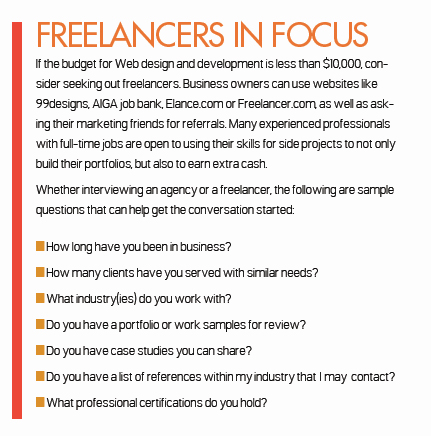Selecting the Right Design & Development Partner for Your Next Project

Many small businesses outsource their Web design and development functions to agencies, so they can focus on their core competencies.
Faced with the complexities of the various technical offerings and the wide range of pricing, however, it can be difficult to select a service provider that can make the greatest impact on a company's bottom line. With some general guidance from those who have gone before them, small business owners can weigh their options and reap the potential rewards of picking the right Web design and development partner.
In-House versus Outsourcing
Small business owners have various concerns when deciding on how to handle their Web development and design projects effectively and cost efficiently. Essentially, entrepreneurs can choose from one of three options. They can (1) provide the functions in-house, (2) hire an agency or (3) outsource projects to freelancers on a project-by-project basis. Each of these options comes with benefits as well as drawbacks.
According to Robin Tooms, vice president of strategy for Savage Brands, a digital marketing agency, "The benefits of hiring internal staff include the intimacy one develops with the company's products and internal stakeholders, which an outside agency is unlikely to achieve. Additionally, an in-house team is more inclined to pursue 'continuous improvement' efforts since presumably they are also maintaining the site and know immediately what is or is not working." Furthermore, explains Jennifer Billings, marketing director of the American Marketing Association, "Small businesses may prefer to hire internal staff to reduce costs, maintain greater control and have greater accessibility to staff, leading to a faster turn-around."
Conversely, Billings adds that agencies can offer greater creative flexibility, experience and objectivity, as they have the advantage of working on multiple, diverse projects. Tooms also believes that agencies can provide the breadth and depth of talent that may be impossible for an in-house staff.
Finding the Right Agency Partner
When scouting for a Web design and development firm, enterprises should first compile a list of needs and consider the expertise required to accomplish those objectives. Then, perform extensive research on agencies that claim to specialize in those services. Ed Schipul, founder and CEO of Tendenci, an open source CMS for nonprofits, advises that a small business owner looks for a solutions partner with a solid reputation, case studies to demonstrate competency and a diverse team that will work with him or her to overcome individual challenges.
Communicating with an agency's designers and past clients is important, but small business owners should not overlook the importance of a firm's own website.
"The technology developments that have occurred over the past two years have raised the bar for designers," explains Schipul. "When hiring an agency, be certain the firm develops sites that are responsive across multiple devices. Furthermore, be sure the site is functional. Although winning awards is impressive, many functional sites such as amazon.com, the premiere ecommerce site, is not a Picasso."
An agency's own website is a good indicator of the quality of work they create, but it's not the only consideration to make. Marlena Jayatilake is a small business owner of LoveThatSpice.com who has first-hand experience hiring a Web development firm. For her fellow small business owners, she suggests choosing an agency that specializes in serving start-ups or enterprises of a similar size. She finds these boutique firms, which tend to be small businesses themselves, to be more accommodating, understanding and willing to work with modest budgets than full-service agencies that handle larger accounts.
She also recommends selecting a provider with a competitive mid-range proposal, not the highest nor the lowest bidder. "You get what you pay for," she explains. "When hiring the cheapest bidder, the quality or service may be sacrificed. Furthermore, the lowest bid may be missing crucial parts of the job that will incur additional fees later. Be sure to review proposals closely and ask questions."
How much can a small business owner expect to pay? Providing a price range for Web services is difficult since so much rests upon the business's specific needs. Individuals may also be unaware of the amount of services necessary to develop their website such as professional photography, video production, shopping cart integration, SSL certifications and more that can impact the final cost of Web design and development.
Warning Signs
Finding the right partner, the perfect fit for your business, takes time and effort. Invest the necessary resources in the beginning to avoid frustrations later. Some warning signs that may suggest the need to move on to the next name on the list include an agency with high turnover, poor communication skills, personality clashes, conflicts of interest, disagreements on design/strategy and inability of the firm to integrate Web services with other marketing initiatives. According to Tooms of Savage Brands, be wary of a design team that makes recommendations that do not fi t within the budget, provides unclear payment terms or demands full payment upfront and seems unwilling to adjust a recommendation based on your feedback and can't communicate why.
Final Words of Advice
Small business owners with no previous website experience can (and likely should) experiment with open source systems (e.g. Word- Press, Magento) and do-it-yourself (DIY) site-building solutions offered through services such as 1&1, GoDaddy, Web.com and others to gain a basic understanding of Web functionality. This experience exposes the small business owner to the capabilities and limitations of the Web and prepares them for the next step. Once the small business owner is armed with this information, they are better equipped to ask the right questions and find the right third-party partner to develop a permanent site. According to Schipul of Tendenci, they can then have realistic expectations and understand the fees and time requirements to perform the Web design and development job correctly.

About the Author: Michelle Wicmandy is a regular contributor to Website Magazine, a lecturer at the University of Houston Downtown and an executive-level marketing and business development professional.

Subscribe to Our Newsletter!
Latest in Web Design








